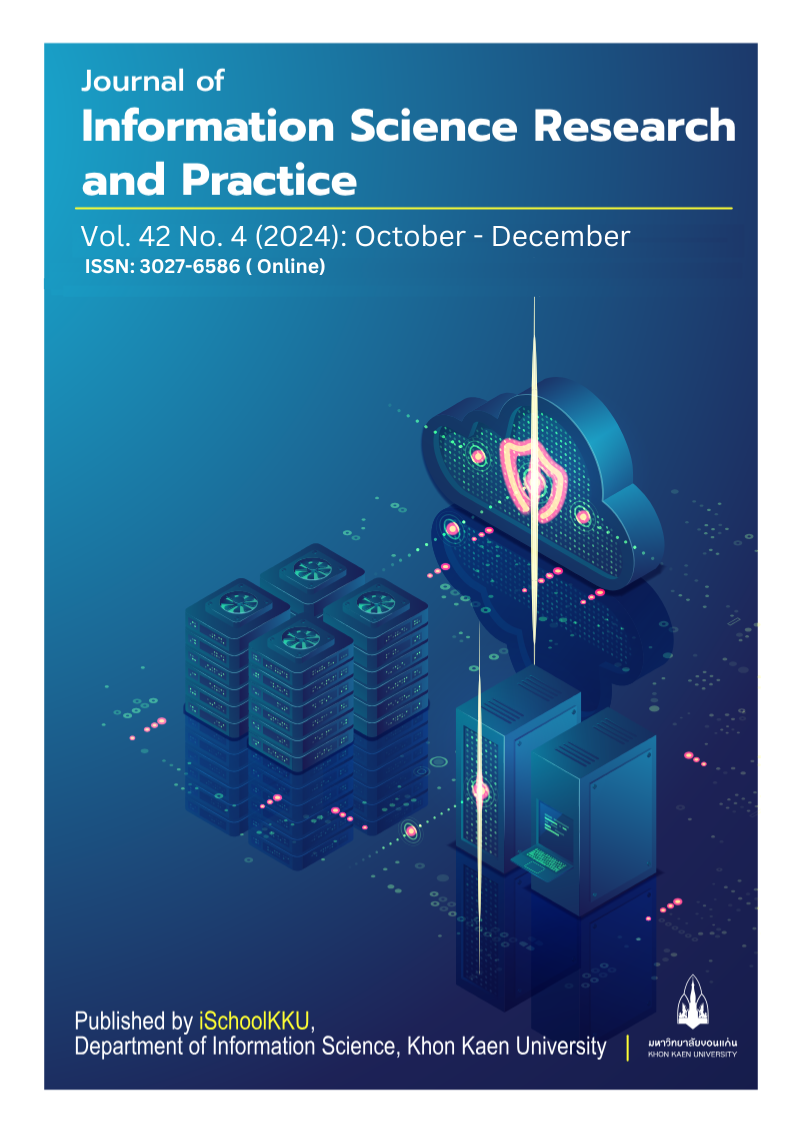Developing Public Relations Media on the Metaverse Platform for Enhancing Engagement by Using Virtual Learning
DOI:
https://doi.org/10.14456/jiskku.2024.29Keywords:
Metaverse, Virtual Learning, Digital Media, User Engagement, Educational Technology, Interactive Environments, Information communicationAbstract
Purpose: This research aims to design and develop effective media on the Metaverse platform, evaluate its quality, and study user engagement within this virtual learning environment. It utilizes modern media technology to create a new experience for learners in the Digital Business Computer Program at the Faculty of Management Science, Loei Rajabhat University.
Methodology: This study employed the ADDIE Model for the development process. The tools used included Spatial Metaverse for creating virtual spaces, infographics, animations, videos, and 3D models. Quality assessment was conducted by five experts, focusing on content, design, implementation and engagement. The sample group consisted of 400 students and undergraduates selected through random sampling. User engagement was assessed using a survey with a Likert scale.
Findings: The development of public relations media on the Metaverse platform for the Digital Business Computing program included the creation of infographics, animations, videos, and 3D models divided into three spaces: General Information, Activities, and Career Guidance and Alumni. Quality assessment by five experts rated all aspects at the highest quality level with the content receiving particular praise. User engagement feedback indicated that interactive content delivery, especially videos, significantly enhanced comprehension, while multimedia integration for critical thinking received the highest score. The platform effectively facilitated engagement and learning acquisition, with its easy-to-navigate interface and real-time interaction tools score of 4.67 and 4.55, respectively. Overall, the Metaverse platform demonstrated exceptional capability in supporting high levels of learners participation and engagement.
Applications of this study: This study demonstrates the Metaverse platform's potential to enhance engagement and learning across education, corporate training, public relations, and healthcare by creating immersive and interactive environments. These environments improve comprehension, participation, and skill development through the use of advanced digital media and virtual simulations.
Downloads
References
Bloomberg Professional. (2023). The Metaverse market, next tech platform. Retrieved from https://www.bloomberg.com/professional/insights/trading/metaverse-may-be-800-billion-market-next-tech-platform
Chomjumjang, S. (2023). Innovation in teaching art education in the virtual world: Metaverse. (In Thai). Journal of MCU Peace Studies, 11(7), 2978-2988.
Digital Government Development Agency. (2022). Digital Government Development Agency. Retrieved July 22, 2024, from https://www.dga.or.th/en/
Ti-Shen, E. T., & Sen, A. (2019). Effective use of interactive videos as an educational tool in higher education – an Asian context. EDULEARN19 Proceedings, 10379–10385. https://doi.org/10.21125/edulearn.2019.2610
Jenifer, S. A., Arfa, K., Deepika, S. (2023). Metaverse. International Journal of Innovative Research in Information Security, 9(3), 215-220. https://doi.org/10.26562/ijiris.2023.v0903.29
Mohamed, K., & Bukhari, S. (2023). The media in Metaverse; Baudrillard’s Simulacra, is Metaverse that begins the Apocalypse?. SSRG International Journal of Communication and Media Science, 10(1), 14–22. https://doi.org/10.14445/2349641x/ijcms-v10i1p102
Lee, H., Woo, D., & Yu, S. (2022). Virtual reality Metaverse system supplementing remote education methods: Based on aircraft maintenance simulation. Applied Sciences, 12(5), 2667. https://doi.org/10.3390/app12052667
López-Belmonte, J., Pozo-Sánchez, S., Moreno-Guerrero, A.-J., & Lampropoulos, G. (2023). Metaverse in education: A systematic review. Revista de Educación a Distancia (RED), 23(73), 1–25. https://doi.org/10.6018/red.511421
Muthmainnah, A., Ahmad, Al, Yakin, P., Mahbub, I., & Seraj. (2023). Impact of Metaverse technology on student engagement and academic performance: The mediating role of learning motivation. International Journal of Computations, Information and Manufacturing (IJCIM), 3(1), 10–18. https://doi.org/10.54489/ijcim.v3i1.234
Song, Y., Cao, J., Wu, K., Yu, P. L. H., & Lee, J. C.-K. (2023). Developing “Learningverse”—A 3-D Metaverse platform to support teaching, social, and cognitive presences. IEEE Transactions on Learning Technologies, 16(6), 1165-1178. https://doi.org/10.1109/TLT.2023.3276574








